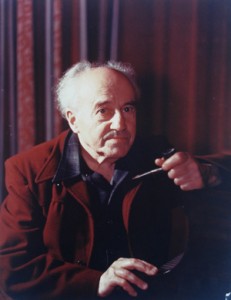The Salt Lake Choral Artists have a tradition of programming at least one large scale sacred work each season. This weekend they’re ending their season with Ernest Bloch’s Avodath Hakodesh (Sacred Service), a work that was last performed in Utah in 1977 by the Utah Symphony under Maurice Abravanel.
The Swiss-American Bloch, who lived from 1880 to 1959, is a rather neglected today, but during his lifetime he was a very popular and well known and respected composer. In the 1930s there were festivals organized around his music, and in 1937 an Ernest Bloch Society was founded with Albert Einstein as its first president. (The organization has been revived in recent years and is now the International Ernest Bloch Society and has renowned cellist Steven Isserlis as its president.) Today, however, even though he was a fairly prolific composer, Bloch is mainly remembered for two works: Schelomo for cello and orchestra and Baal Shem for violin and orchestra.
Bloch was born in Geneva into a Jewish family and many of his works contain Jewish themes or elements. But for much of his life Bloch didn’t practice his religion. Avodath Hakodesh, which can accurately be described as a Jewish oratorio, was his attempt to reconnect with his faith. “He wanted to go back to his Jewish roots, whatever they were,” said Laurence Loeb, cantor at Congregation Kol Ami and advisor to the Choral Artists as they prepared the work.
Written between 1930-33 Avodath Hakodesh was commissioned by Temple Emanu-El in San Francisco and premiered there in 1934. The work is written on a grand scale for baritone solo, chorus and orchestra with texts in Hebrew.
The problem for Bloch in writing this work was that he wasn’t very conversant in Jewish liturgy. “He wasn’t familiar with it and he couldn’t read Hebrew,” Loeb said. But that didn’t stop him. “As a guidepost he used the old Union Prayer Book,” a book that consists of daily prayers and which was originally published over a century ago to serve the needs of Reform Judaism. “He picked certain passages and ordered them as they were laid out in the prayer book,” Loeb said, “but (Avodath Hakodesh) is compact compared to the traditional service.” And since the Union Prayer Book wasn’t written in Hebrew, Bloch had to have the passages he used for his work translated.
Musically, Bloch sparingly employs traditional melodies and scales, and he changes what he does use. “The scales and themes he uses are his own, and he does this successfully,” because the music invokes the spirit of traditional music, Loeb said. “There is quite a bit of originality in this work.”
Salt Lake Choral Artists’ music director Brady Allred said Avodath Hakodesh has been on his to do list for many years. “This is a work I’ve wanted to do since my graduate choral repertoire class, and this was the right time to do it. It’s a work I want to present to the community and also to the singers in the Choral Artists so they can experience a major work from another religion.”
One of the things Allred likes about Avodath Hakodesh is that Bloch reached back into his own heritage. “Since he wasn’t brought up as a Jew, he had to discover his heritage.” And even though it’s a work based on Jewish liturgy and traditions it has a broader reach. “He gave it universal appeal, and I like that,” Allred said. “It’s message is that we need to work toward peace and understanding.”
CONCERT INFO:
- What: Ernest Bloch, Avodath Hakodesh (Sacred Service), Tyler Oliphant, baritone, Salt Lake Choral Artists and Orchestra, Brady Allred, conductor
- Venue: Libby Gardner Concert Hall, University of Utah
- Time and Date: 7:30 p.m. April 28
- Tickets: $20 general, $8 students, group rates available for 10 or more
- Phone: 801-232-7521
- Web: www.saltlakechoralartists.org
ALSO: Cathedral of the Madeleine, 8 p.m. April 29, free, 801-328-8941, www.utcotm.org.
ALSO: Pre-concert lecture by Laurence Loeb, Scanlan Hall (lower level of the Cathedral of the Madeleine), 7 p.m. April 29, free.

